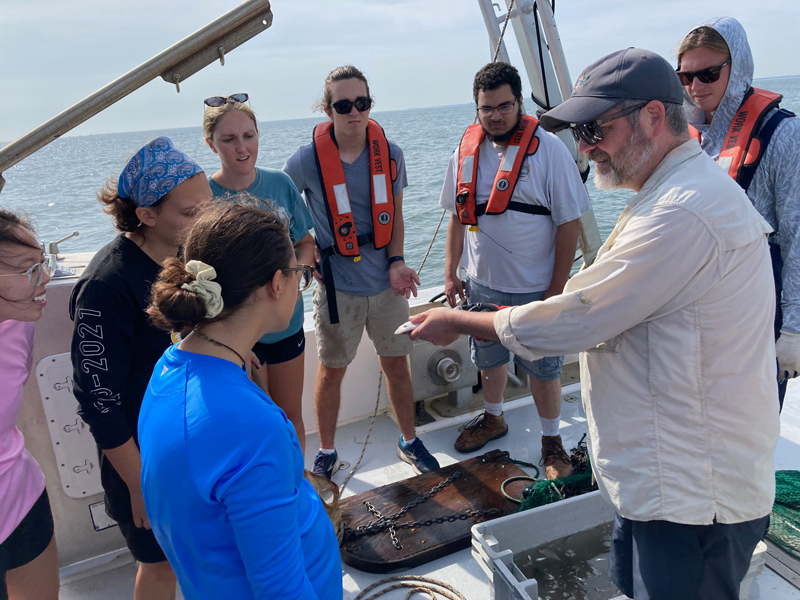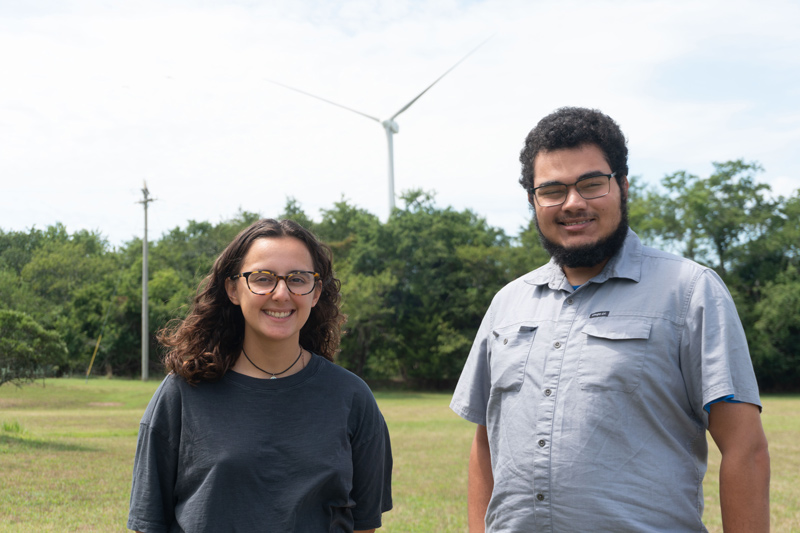


Undergraduate marine research
Photos courtesy of Joanna York and Kevin Liedel September 06, 2022
Students from schools across the country spent the summer at UD’s Lewes campus
For undergraduate students studying in science, technology or math fields, hands-on research experience in the field and in the lab is critical. To help students from institutions across the United States gain that vital experience, the University of Delaware offered a 10-week Marine Science Summer Program Research Experience for Undergraduates (REU), pairing students with UD faculty mentors who helped guide them through marine science research.
The program is supported by a grant from the National Science Foundation’s Division of Ocean Science.
Joanna York, associate professor in the School of Marine Science and Policy and director of Delaware Sea Grant (DESG), oversees the program and said it was great to chart the growth of the students over the 10-week period.
“It’s really amazing to watch them become experts at something over 10 weeks,” York said. “For the students to start a brand-new project in a field that they don’t know much about and to own it over those 10 weeks is inspiring to watch. They get committed to their topic. They get excited about it. They really delve into it, and they own it by the end of the summer.”
This year saw 10 students attend the program and spend their summer on UD’s Hugh R. Sharp Campus in Lewes.
“The energy in Lewes is really wonderful when there’s all these students around,” York said. “We welcome all of these undergraduates to campus for what ends up being a rich research experience. You walk into campus in Lewes and it’s buzzing. There are people and activity and things going on and that’s really energizing for the whole community.”

Jacob Williams
Jacob Williams, an undergraduate student from Temple University who is working towards a bachelor’s of science in biology, spent the summer working with Jennifer Biddle, professor in the School of Marine Science and Policy (SMSP).
Williams spent the summer utilizing metagenomic analysis to look at deep marine sediments. Metagenomic analysis is a discipline of bioinformatics that allows researchers to examine uncultured bacterial genomes as a way to learn about the bacteria or other types of organisms based on their genetic information.
“Basically, it allows us to figure out some things that we either aren’t able to see or are able to culture in a lab,” Williams said. “For instance, we can culture E.coli and examine their metabolism through those functions, but for a mixed microbial community that you find in a deep marine sediment, we don’t really have solutions or an idea of what we need to create a proper environment to culture them, whether it be high temperatures or high pressures.”
Using samples collected off of Costa Rica at the continental margin at depths between two and 92 meters below the seafloor, Williams’ work focused on examining the bacterial genomes from the mixed microbial community and then seeing what they could find from that community.
It turns out Williams was able to help discover an entirely new phylum of bacteria, one that may be named after him.
“We essentially found this new phylum, which I’ve been told is not an entirely usual thing to happen,” Williams said. “So that was rather exciting, and we did a lot of analysis to make sure that what we found was in fact something new.”
Biddle explained that they have submitted a possible name for the phylum.
“We will propose to name the phylum: Sederibacteria (Sederi- for sediment); then we'll propose the Genus Hydrogenotropha (eating hydrogen) and Species williamsii (after Jacob),” said Biddle. “It has to go through peer review, so we'll see if it's accepted.”
Williams said that had it not been for Biddle, the members of her lab, as well as his fellow REU participants, he would not have been able to have made such an incredible discovery.
“It was by the efforts of those in the Biddle Lab and, to be honest, the other interns of the REU program. It was a lovely time to work alongside them and to work with those at the University of Delaware,” Williams said. “I’m very glad that I was able to have the opportunity, and I am just as surprised as everyone else at what I was able to accomplish in the time I had.”
Kaylin Regan
Another student who participated in this year’s REU program was Kaylin Regan, an undergraduate student at the University of West Florida who majors in marine biology with a minor in statistics.
Regan spent the summer working with Ed Hale, assistant professor in SMSP and a marine advisory service specialist for DESG, examining the bycatch — any non-target marine organism incidentally captured while fishing — within a recreational blue crab fishery.
Working with two graduate students — Jennifer Repp and Randy Feris, both master’s level students in the College of Earth, Ocean and Environment — Regan said that the three of them would go out on the water and deploy crab pots in the Indian River Bay where recreational crabbing popularly occurs.
Every 48 hours, the group would go back, retrieve the pots to examine the bycatch, and deploy new pots. This allowed them to see which bycatch species were being caught, where they were being caught, and if the presence or absence of derelict and active pots influenced bycatch catch rates. They were also able to examine environmental covariates such as sediment, vegetation, temperature, and salinity to see if there was an association between those variables and the bycatch catch rate.
With a desire to go into fisheries work after finishing her education, Regan said it was great to get so much experience out in the field.
“Over the span of the REU, I think I had 75 hours on the boat, which I would not have gotten back home,” Regan said. “With the REU program we were also able to do a small-boating course with the Coast Guard which included being able to be on the water and drive a boat, I can now put small boating experience on my curriculum vitae.”
In addition, Regan was able to learn about the process of applying to graduate schools from Hale, Repp and Feris — as well as pick their brains and learn about their contacts from certain programs. With Hale, she was able to sit down and create a graduate school timeline about contacting advisers and the application process. She was also able to write a full, academic paper about her summer research and said that overall, the REU program was a great experience.
“I loved being in Lewes where it’s a smaller campus,” Regan said. “It gave me a chance to meet more people and everyone was really friendly. There’s a super close-knit community at the University where everyone helps each other out. This summer, I was able to go longlining for a shark ecology project and I also helped with a fellow lab member’s oyster aquaculture project. Likewise, they came out on the boat and helped with my project. By assisting with other projects, I was able to gain experience with new field techniques and methodologies. The small size of the program allowed me to get more time to be with Dr. Hale and the two graduate students. By the end, I didn’t want to leave because there was so much to do. It opened up a whole new world.”
Contact Us
Have a UDaily story idea?
Contact us at ocm@udel.edu
Members of the press
Contact us at 302-831-NEWS or visit the Media Relations website

